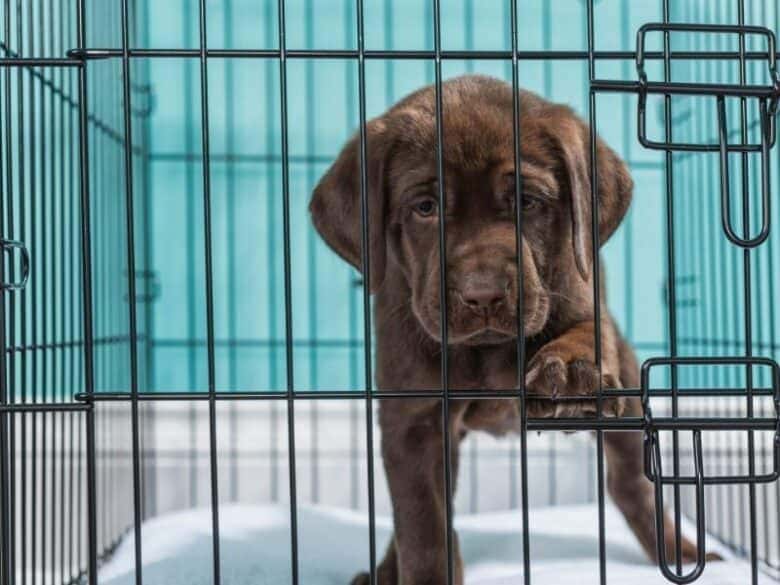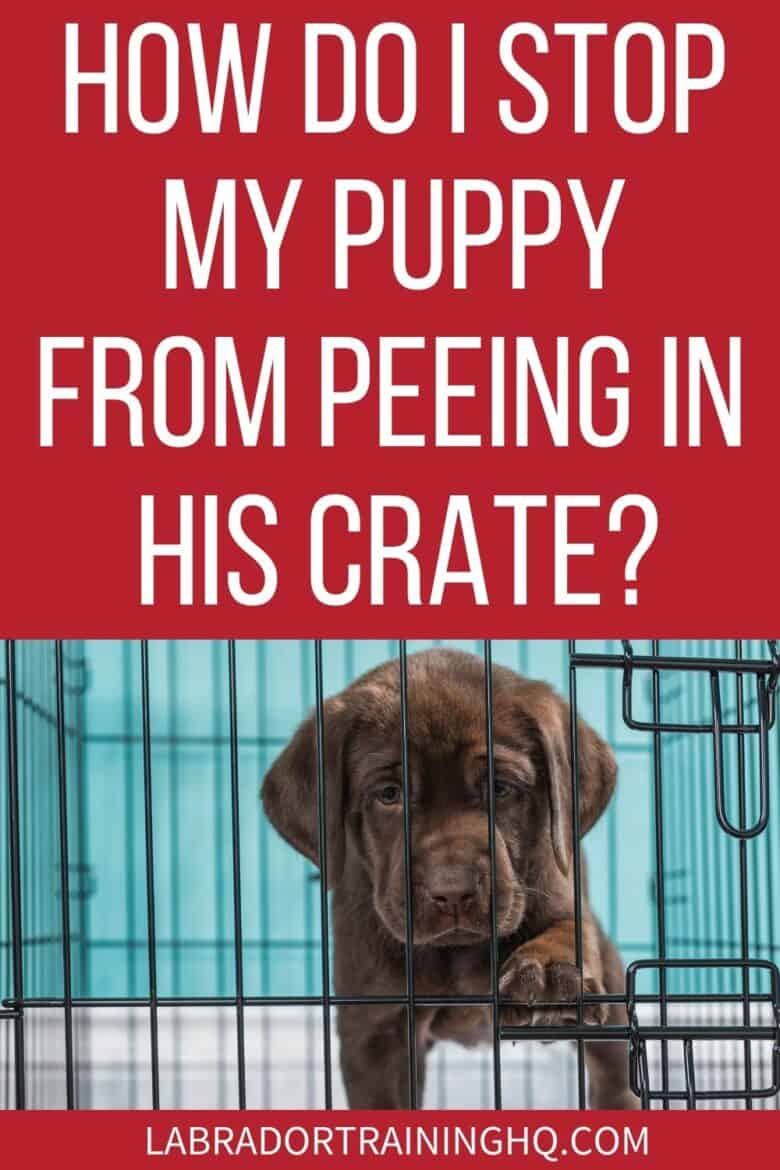This post may contain affiliate links. We may earn money or products from the companies mentioned in this post.
You have a new puppy. Hooray!
He’s adorable, playful, and sweet.
Everything’s going well–except one thing…

He’s having accidents in his crate.
Puppies naturally want to keep their dens clean. So when they have accidents in their crates, we need to determine why in order to fix the problem.
Reasons Why Puppies May Have Accidents in a Crate
There are many reasons why puppies may have accidents in their crates. Some are medical, whereas others involve house training or scheduling problems.
We have to make sure that we’ve properly crate-trained the puppy. And we need to take him out to potty at the proper times.
The reasons may include the following:
1. Improper Crate Size
Puppies shouldn’t want to go to the bathroom in their crate. A puppy should want his den area to remain clean.
If a crate is too large, some puppies will potty in one part, and sleep and play in another section.
A crate should be just large enough for a puppy to lie down in, stand up in, and turn around in.
They sell wire crates with dividers that can be moved to expand as the puppy grows.
So, you would purchase a crate that will accommodate your dog’s size as an adult. But you can keep expanding the area he has access to as he grows by moving the divider.
2. The Crate Wasn’t Properly Introduced
Some puppies may have accidents in a crate because the crate wasn’t properly introduced.
A puppy may have just been placed in a crate as punishment or without teaching him that a crate is a great place to be.
Without a slow introduction to a crate and making it a positive experience, a stressed, anxious puppy may have accidents.
So, when introducing the crate, make sure that the puppy has gone to the bathroom prior to entering it. Then, make going in a positive experience.
Place a couple of small treats in. Place a safe Kong frozen with a little mashed dog food in it.
Put the crate next to your bed at night and in a room where you’ll be with him in the day.
Make sure that he’s tired prior to his entering the crate. Always set him up to succeed.
3. The Puppy May Not Be Able To “Hold It” For Too Long
The reason a puppy has an accident in his crate may be as simple as the fact that he needs to potty.
The general rule is that a puppy can only hold his urine for about one hour more than his age in months. So, a two-month-old puppy may be able hold his urine for three hours.
So don’t expect too much at first. By around four months old or so, he’ll start to have more bladder control.
Always make sure that he goes to the bathroom prior to entering the crate. And, if you hear him moving around, whining, crying, or barking while in the crate and you’re not sure whether he has to go to the bathroom, err on the side of caution.
Carry him out to his potty spot and use his potty cue (“go potty”). If he potties, praise and reward.
If it turns out that he didn’t have to potty, but instead, just wanted to play, just bring him back into his crate.
You’ll get to know his signals. And he’ll begin to realize that he’s going out only to potty, not to play.
4. Medical or Health Reasons
If you’ve ruled out other reasons, or just to be safe, a vet check may be in order.
If your pup is having accidents in the crate, he may have a urinary tract infection or other health problem.
I was training a lab mix puppy who was learning to be house trained.
The owner was following feeding and pottying schedules. But the puppy had many accidents in her crate.
I convinced the owner to take the pup to the vet for a check-up. It turned out that the puppy had a urinary tract infection.
Once that was cured, the house training was a breeze.
He may have to go because of an unfavorable reaction to a vaccine or medication he’s on.
Or he may have ingested something in your house or yard that causes him to urinate or defecate. Even food and treats that are too rich for him can cause loose stools.
5. Scheduling May Not Be Proper
Puppies need a proper feeding and potty schedule to be successfully house trained.
So feed him at the same times every day.
Very young puppies may eat three or four times a day. And they’ll have to potty after they eat, sleep, play, chew, and after any excitement.
It’s important that he is taken out and potties prior to being crated.
And you may have to adjust his schedule and your expectations. He may simply have to potty more often than he is taken out of his crate.
Or he may not be given a sufficient amount of time to potty when you take him out to go. Then, he can’t help but go to the bathroom when put back into his crate.
So make sure that you’re taking him out to potty at the right times and that he’s given a sufficient opportunity to go.
If you can’t meet these requirements, have a trusted friend, relative, or pet professional feed him and take him out to go to the bathroom at those times.
6. The Puppy May Be Used To Pottying in His Crate
Depending on your puppy’s background, he may be accustomed to going to the bathroom in his crate.
This happens sometimes when the puppy comes from a puppy mill, pet store, or other irresponsible breeder.
These sources often keep a puppy in a crate or similar area and they don’t take the puppy out to go to the bathroom. The puppy then has no choice but to potty in his enclosure.
You can still probably successfully train a puppy to not go to the bathroom in his crate. But it will require diligence and a lot of patience.
I’ve even rescued a shih tzu (Trevor) and a golden retriever (Brandi) who were former puppy mill breeder dogs.
They were used to going to the bathroom in crate-like enclosures, because they had no other choice.
Trevor was about four years old and Brandi was even older when they were rescued.
I treated them as if they were puppies and took a lot of time house training them and getting them used to a crate as a positive experience.
The crate helped house train them and they didn’t have accidents after they learned to love their crates. Of course, the process took a few weeks. But I saw continued improvement during that time.
They learned to be clean and appreciated their new life.
7. The Crate or Puppy May Not Be Clean
Puppies may have accidents in their crates if either they or their surroundings aren’t clean. Remember: dogs can smell things thousands of times better than we can.
So if a puppy has already had an accident in his crate and either he or the crate or objects in the crate like a bed or toys aren’t deodorized to him, he may continue to have accidents in his crate.
This can also occur if you’ve borrowed a crate from someone and it wasn’t properly deodorized before he uses it.
So use an enzymatic cleaner and rinse and dry before the puppy uses the crate. And if the puppy becomes dirty with his urine or feces, he should be bathed with a high-quality puppy shampoo.
8. The Puppy May Like Pottying on Bedding
A puppy may like pottying on a soft, porous material like a blanket or bed. Or he may learn he can potty on it, then move the blanket around to cover his indiscretion.
If you’ve ruled out other causes such as those listed above, you can try removing any bedding from his crate. Try this for a week or so to determine whether this was the reason for his soiling in his crate.
You May Need Additional Assistance
If you’ve ruled out the above-mentioned considerations and attempted all you can do, including a vet visit to rule out physical problems, you may need other professional help.
Contact a qualified, positive reinforcement dog trainer who can help you house train your pup using a crate.
You may even decide not to use a crate. But some sort of confinement to a safe area such as an exercise pen should be used.
A puppy can have urine and feces accidents.
He may also get into things and become injured or ingest something that may harm him if he’s given too much freedom. Or he may destroy household items if not properly confined.
Generally, it’s more difficult to house train a puppy not using a crate. If you persist, most puppies can be crate-trained and even learn to like their crates if the training is done properly.
My dogs go into their crates on their own to rest when they feel like it.
What NOT To Do
The crate should be properly introduced in a positive way. It should never be used for punishment.
And you should never punish the puppy for having an accident in the crate. Instead, determine why he had accidents in his crate and fix the problem using positive methods.
Final Thoughts
Crates can be a great tool when properly used to house train your puppy. They also keep the puppy safe when you can’t supervise him.
If he’s having accidents in his crate, it’s important to determine why so that you can fix the problem.
Has your puppy had accidents in his crate?
If so, what have you done to fix the problem?
Tell us about it in the comments section below.
Save To Pinterest

Top Picks For Our Dogs
- BEST PUPPY TOY
We Like: Calmeroos Puppy Toy w/ Heartbeat and Heat Packs - Perfect for new puppies. Helps ease anxiety in their new home. - BEST DOG CHEW
We Like: Bones & Chews Bully Sticks - All of our puppies love to bite, nip, and chew. We love using Bully Sticks to help divert these unwanted behaviors. - BEST DOG TREATS
We Like: Crazy Dog Train Me Treats - One of our favorite treats for training our service dog puppies. - BEST FRESH DOG FOOD
We Like: The Farmer's Dog - A couple months ago we started feeding Raven fresh dog food and she loves it! Get 50% off your first order of The Farmer's Dog.
For a list of all the supplies we get for our new service dog puppies check out our New Puppy Checklist on the PuppyInTraining.com blog.
2 comments
My puppy is pee pad trained but has accidents in his kennel even when he is not locked in,I leave the door open at most times,she has a blanket of her own but tends to pee on it on occation.I since took out the blanket to see how it goes,but the kennel is a little big for her.
I adopted an 8 month old malese/shitz tzu. Thinking he was pretty neglected in previous home. I’ve started crating him, and he is peeing in the crate. He CAN hold over night, for up to 8 hrs. I know I;m taking on past behavior, but I am at a loss what to do. I come home to let him out after 2 hrs, he goes outside, but when I come home for lunch, 2.5 hrs later… he has STILL peed. There is no blanket as he was peeing on that. I truly believe this is a behavior issue, but not sure how to fix it. Any help is greatly appreciated!!